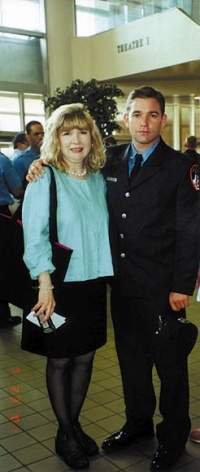c. 2008 Religion News Service
NEW YORK _ After the memorial Mass on Oct. 26, 2001, for her son Christian, a probationary firefighter who died in the Sept. 11 attacks on the World Trade Center, Sally Regenhard didn’t proceed to a cemetery.
There was no cemetery because there was no body. Christian’s remains were never found.
Now, more than six years later, Regenhard is part of a civil lawsuit against New York City by the group World Trade Center Families for Proper Burial, which was founded in 2003 to retrieve the remains of family members in hopes of providing a proper burial.
The suit, filed by veteran civil rights attorney Norman Siegel, turns in part on a novel legal claim: that the families’ inability to bury their loved ones according to the tenets of their faith violates their First Amendment right of free religious exercise.
The families want a portion of the 1 million tons of World Trade Center debris that was sent to Fresh Kills landfill on Staten Island to be resifted and _ even if no human remains are identified _ transferred to a location that can serve as a mass grave.
The families insist that material must contain, at least in part and albeit ashen, the bodily relics of their loved ones.
“It’s a sin and an ethical, moral and religious failure,” Regenhard said of the absence of a burial site for her son and other victims. “If you don’t have a marker, if you don’t have a grave, generations going forward are not going to know this person lived and died. A grave is not only evidence of a death, it’s evidence of a life.”
No remains have been found for about 1,100 of the 2,749 people killed at the Twin Towers. The group says it represents 1,000 families whose relatives died in the attacks, though the suit names only 17 individual plaintiffs.
For its part, the city says the search process for human remains was exhaustive, and that all search procedures at Fresh Kills were religion-neutral and generally applicable to all, the basic standards by which most free exercise cases are judged.
A federal judge has already expressed skepticism about the claims, but regardless of the outcome of the suit, the claims highlight the spiritual significance of burial across religions. The 17 named plaintiffs include Christian, Jewish and Hindu families.
“It’s very much a part of most religious cultures to make sure community members have some sort of control over the physical remains, whatever condition they may be in,” said Gary Laderman, an expert in death rituals at Emory University in Atlanta.
“There is a core fundamental attachment to the dead _ both as they are transitioned out of the world of the living and in terms of post-mortem afterlife.”
Since ancient times, societies have stressed dignified treatment of the dead. In Homer’s “The Iliad,” the Trojan King Priam values the retrieval of his son’s body so greatly that he risks his life to beg Achilles for its release. The epic ends with Hector’s funeral, a critical ritual for the people of Troy.
“As Christians we affirm that eternal life is theirs, and that is regardless of the physical burial,” said Rev. Davida Foy Crabtree, who leads the Connecticut conference of the United Church of Christ and who has spoken out on behalf of the World Trade Center victims’ families. “But Christian teaching is not only about the individual body and its burial. It is also about the responsibility of the wider community to demonstrate care, compassion and right decisions about how we memorialize those who have died.”
Other religions also emphasize the needs and responsibilities of the bereaved.
“The Hebrew word for funeral, `levayah,’ means accompaniment or escort. The whole metaphor is that the family accompanies their loved one to their eternal home, and the community is accompanying mourners in the process,” said Rabbi Simkha Weintraub, the rabbinic director of the National Center for Jewish Healing and an advocate for WTC Families for Proper Burial.
Weintraub’s 9/11 support group sometimes has met at a bench in Central Park in memory of a member’s son. “But there is a particular value to having a burial site where you have the remains,” he said.
While the names of the dead will be listed at the planned World Trade Center memorial, family members say an inscription falls short.
“It’s not a cemetery,” said plaintiff Diane Horning, a Catholic and one of the group’s founders. Her son Matthew died in the North Tower of the Trade Center. “Not having that, there’s a break in your ability to continue the mourning process. You’re kind of stuck in one place. (A cemetery) gives solace … a place of solace and community.”
Unlike other families in the suit, Horning and her husband received pieces of bone from their son. She noted that a casket representing the 184 victims of the 9/11 attack on the Pentagon _ including five whose remains were never identified _ was interred at Arlington National Cemetery. “That’s what we do, regardless of religious bent. We don’t just abandon our dead.”
At a federal district court hearing in New York last February, Judge Alvin K. Hellerstein called the plaintiffs’ claims “heart-rending” but seemed skeptical that the city’s actions had violated the Constitution.
Hellerstein’s final decision is expected in the next several months.
KRE/PH END CIPOLLA900 words
Photos of Christian and Sally Regenhard, and Matthew Horning, are available via https://religionnews.com.
Eds: Davida in 14th graf is CQ





